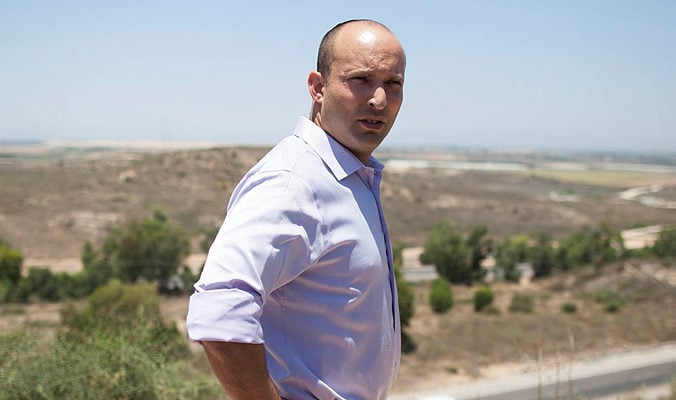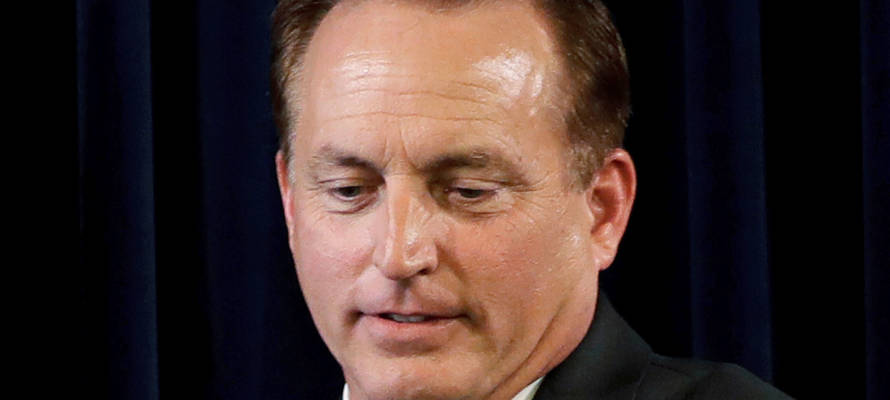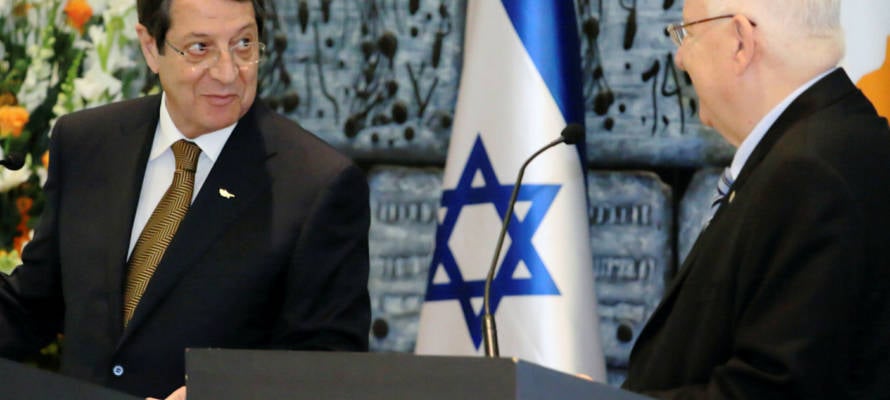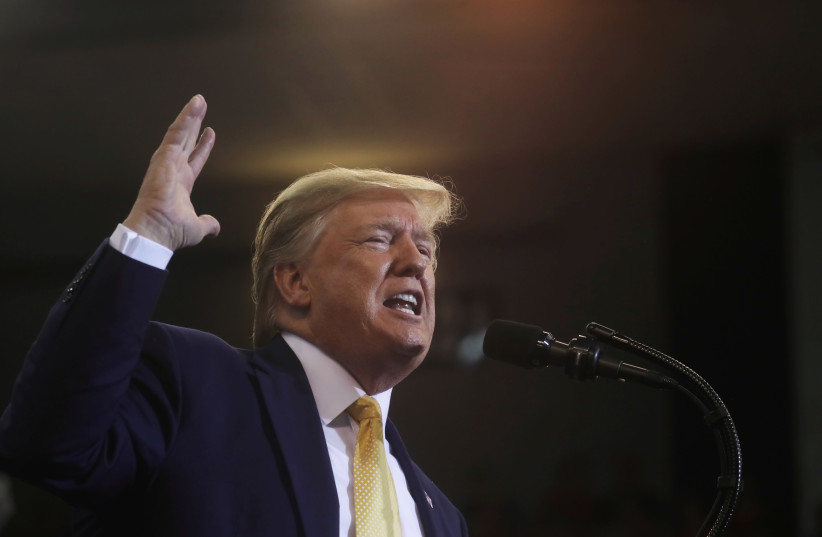ΕΝΗΜΕΡΩΣΗ ΧΩΡΙΣ ΛΟΓΙΑ! ΜΙΛΑΕΙ ΑΠΟ… ΜΟΝΗ ΤΗΣ!..

1.
Corbyn Crushed, A Telling Lesson for Democrats
But will the Democratic Party take heed?

British citizens went to the polls this past Thursday and handed opposition leader Jeremy Corbyn a humiliation that will permanently stain his already tarnished reputation. His Labor Party sustained a stunning rout at the hands of the conservatives and suffered its worst showing since before World War II.
True to form, Corbyn and his die-hard acolytes refused to take any responsibility for the calamity befalling their party and instead, blamed Brexit and the media for their defeat. Corbyn’s vapid explanations and denials are steeped in a combination of hubris, venality and fantasy. Britain’s citizens plainly recognized Corbyn for what he was, a vile, hard-core socialist and anti-Semite who could not be trusted to lead the nation.
As noted by Katie Hopkins at FrontPage, Corbyn ran on a platform that would have fostered an atmosphere inimical to the free market system. He called for the nationalization of utility companies. Wanted illegal aliens to have access to Britain’s already heavily burdened healthcare system and wanted to restructure the inheritance tax in a manner that would have further punished those who managed to accumulate some measure of wealth during their lifetime.
Corbyn was dogged by other issues as well that had nothing to do with his hard-core socialist agenda. In keeping with his anti-Western dogma, he was an avid supporter of the Irish Republican Army and pointedly refused to condemn IRA terrorism, even when pressed on the issue. He was also a rancid anti-Semite who considered Hamas and Hezbollah his “friends” and championed their cause. Under his leadership, antisemitism in the Labor Party was stoked and even encouraged, while Jew-haters swelled the party’s ranks. Allegations of antisemitism were largely ignored and swept under the rug. During an interview with the BBC’s Neil Andrew just two weeks prior to the election, Corbyn was given no less than six opportunities to apologize to Britain’s Jewish community and tellingly refused to do so.
The U.S. Democratic Party would be wise to heed Britain’s thorough repudiation of Corbyn. Since the ascension of Obama, the party has veered away from its centrist bent and this alarming leftward trajectory has increased markedly in the last four years. Led by the likes of AOC, Rashida Tlaib and Ilhan Omar, the party’s platform has changed to the point where it’s beginning to resemble Corbynism in both manner and tone.
During the first debate, all the candidates raised their hands signifying their positive view of extending healthcare benefits to illegal aliens. Joe Biden seemed hesitant and took note of the other raised hands before raising his own. All the Democratic candidates would reverse in whole or part, Trump’s successes in thwarting illegal immigration. Some, Like Bernie Sanders and Elizabeth Warren, would even abolish the Immigration and Customs Enforcement agency, the federal branch responsible for immigration enforcement and countering transnational crime. All the Democratic Party candidates would raise taxes, impose burdensome regulations on business, and have exhibited varying degrees of climate change militancy, with some like Sanders endorsing AOC’s catastrophic Green New Deal.
The Democrats have also made no secret of their hostility toward the fossil fuel industry and would reverse gains made by this energy sector during Trump’s tenure. In fact, the U.S. fossil fuel industry marked a major milestone in September becoming, for the first time since records began in 1973, a net exporter of crude oil and petroleum products. Kiss that achievement goodbye under any Democratic nominee.
Democrats will seek to broaden government interference in healthcare by either expanding the disastrous Obamacare system, as suggested by Biden or by going full-blown socialist and implementing the single-payer healthcare system, as suggested by Warren and Sanders. Either option means higher taxes, higher premiums, higher co-pays, less innovation in pharma, inferior treatment, and more government interference in healthcare choices.
Finally, like the British Labor Party, the Democratic Party has become infested with antisemitism. It is the party that the likes of Ilhan Omar, Rashida Tlaib, AOC, Elizabeth Warren and Bernie Sanders call home. It is the party that could not unequivocally bring itself to condemn Omar after she spewed a malicious antisemitic trope on Twitter which made reference to Jewish wealth buying votes and dual loyalty canards. It is the party that embraces the BDS-supporting, terrorist-embracing, foulmouthed Linda Sarsour, who now acts as a surrogate for Sanders. Two weeks ago, Sarsour was recorded calling Israel “a state…built on the idea that Jews are supreme to everyone else.” Former KKK head David Duke has espoused near-identical views. Despite engaging in blatant anti-Semitic rhetoric, the Sanders camp took no remedial action against Sarsour. Worse yet, to my knowledge, not a single Democratic candidate condemned her toxic remarks.
The British Labor Party is now in tatters with its leadership pointing blame at everyone and everything – the media, Brexit – but themselves. Sadly, there is little these days distinguishing the Democratic Party from its ideological twin across the Atlantic. That fact will doom the Democratic Party to failure in 2020.
Τhe Totalitarian Legacy of the Bolshevik Revolution
The contributors to a new book resist “the great forgetting.”

Mark Tapson is the Shillman Fellow on Popular Culture for the David Horowitz Freedom Center.
Two years ago, on the centennial anniversary of the Bolshevik Revolution in Russia that ushered in a century of mass murder and misery, the Trump administration declared a National Day for the Victims of Communism. The New York Times, meanwhile, predictably celebrated the blood-soaked milestone with a series of opinion pieces touting the many upsides of Communism, such as better orgasms for women. The series was titled, with stunning tone-deafness, “Red Century.”
Also on that anniversary in 2017, Bucknell University, a private liberal arts college in Lewisburg, Pennsylvania, held a symposium titled “Legacies of the October Revolution,” organized by Bucknell professor of sociology Alexander Riley and associate professor of English Alfred Kentigern Siewers. That symposium spawned an important new book titled The Totalitarian Legacy of the Bolshevik Revolution, edited by Riley and Siewers and featuring essays from three participating scholars. Contrary to the New York Times’ whitewashing, the book’s evaluation of the October Revolution is unequivocally damning.
“Now, a century later, the historical evidence on the nature and legacy of the Bolsheviks and the regime they established is indisputable,” writes editor Riley in the foreword, “Challenging Bolshevik Myth and the Poetry of Totalitarianism”:
None of the utopian goals to which they purported to aspire – the end of inequality and want, an efflorescence of humane cultural values, a more just and democratic social order – were realized. Instead of these noble ends, the Bolsheviks produced the world’s first totalitarian state, a one-party dictatorship whose political power rested almost entirely on the threat and frequent implementation of mass violence.
It gets harsher from there. The book’s essays by a trio of scholars offer “a summary analysis of the historical record books on the Bolshevik reign of terror, a working hypothesis on what produced the distorted and malevolent ideologies and practices that sustained Bolshevism, and an effort at understanding how considerable numbers of intelligent and conscientious individuals could have come to believe such intrinsically unbelievable things” about it, Riley writes.
In the first of three brilliant essays, “Lenin and the Bolshevik Revolution: The Invention of Totalitarianism,” French historian and former Maoist militant Stéphane Courtois, author of more than 30 books on communism and totalitarianism (including lead authorship of the essential work on global communism, The Black Book of Communism), undertakes to explain how Vladimir Ilyich Ulyanov, aka Lenin, became the founder of totalitarianism. Courtois demonstrates that Lenin shared with his successor Stalin “the same merciless, amoral, dehumanizing view of political opponents.” It is a strategy familiar to anyone who has been demonized by today’s Democrat Party.
Courtois concludes that the revolution was catastrophic not only for Russia, but for Europe, where “Lenin and Stalin greatly facilitated Hitler’s rise to power in 1933,” and for the whole world through the spread of Communism to Asia, Africa, and Cuba. And now “this totalitarian model has since migrated from a moribund Communism to a triumphant radical Islamism,” a “disastrous legacy” which is “affecting the entire planet.”
In the second piece, “The Russian Revolution and the Soviet System: Assessments, Impact, and Western Perceptions,” Hungarian-born scholar Paul Hollander explores the nature of the Bolshevik Revolution, the attraction it holds for Western intellectuals, and the reason for its eventual collapse. He points out the religious impulse underlying the revolution, which promised paradise on earth – what Thomas Sowell has called “the quest for cosmic justice.” Hollander quotes Bertrand Russell as saying that “Bolshevism is not merely a political doctrine; it is also a religion, with elaborate dogmas and inspired scriptures.” (David Horowitz has often noted that Progressives – rebranded Communists – are not merely political activists but religious fanatics.) As Alexander Riley puts it in his foreword, “All the injustice of the old world is to be undone by the totalitarian moralizing leader and government, and so these figures and their regimes are praised as religious saviors and heavens on earth.”
Historian Ron Radosh, professor emeritus of history at the City University of New York and a friend of (and former fellow traveler with) David Horowitz before their political conversion from radical left to right, is the author of the third essay, “Soldiers for Stalin: Why American Communists Betrayed Their Own Country and Spied for the Soviet Union.” In it he tells the story of such “soldiers of Stalin” as Whitaker Chambers, Alger Hiss, and Julius and Ethel Rosenberg, who all believed they were helping their own country by helping the Soviet Union create a peaceful world community. “They proved by their actions that they were patriots – but Soviet patriots, not American ones,” Radosh concludes. “Their actions prove the lengths to which some Communists and fellow travelers went when guided by ideology.”
Editor Siewers closes the slim (but dense with ideas) volume with an afterword titled, “The Valley of Dry Bones: Towards a Rhetoric of True Resistance,” in which he argues that the contributors to the book “represent the most vital genre of modern literature: A rhetoric of resistance to totalitarianism,” to the self-destructive nihilism of Communism. They stand on the shoulders of such giants as Slozhenitsyn, Orwell, Arendt, and Dostoevsky in a resistance to the collective, willful amnesia too many of us have embraced a century after the brutal execution of the Russian royal family (at Lenin’s command).
As evidence of this “great forgetting” and the staying power of Bolshevik myth, editors Riley and Siewers cite the left-leaning obstruction they themselves experienced organizing the symposium that gave birth to this book: “When we solicited material support from university departments for the events, some members of one department attacked what they viewed as our intrusion into a topic they claimed as exclusively their own, though not a single member of that department publishes on the Russian Revolution… Not content with accusations about our intentions, their department mocked our request for support by pledging the sum of… $19.17,” a reference, of course, to the year of the October Revolution.
After the event, another group of colleagues complained to a faculty discussion board that the symposium’s participating scholars were mere “narrow ideologues” who lacked the proper perspective on the topic. In another response, colleagues wrote a letter cheering Bolshevism and Lenin as models for contemporary social revolution. “Seemingly of no importance in our colleagues’ vision of the proper way to mark the centenary was the investigation of the political methods by which tens of millions of human beings were put by Lenin’s policies and his secret police into a condition in which they would never dream of anything again,” Riley states.
The editors go on to note that although it may be “hard to believe that there can still exist such aggressive defenders of Lenin and his revolution in this day and age,” such intellectual delusions about the Bolshevist Revolution dominate the Bucknell campus and extend far beyond it, which makes The Totalitarian Legacy of the Bolshevik Revolution and its contributors and editors all the more essential to resist the great forgetting.

* * *
Picture from Royal Opera House
3.
Chicken Pelosi
The House Speaker declines to move her impeachment clown show to the Senate.

Wednesday night, House Democrats passed two articles of impeachment against President Trump. According to the U.S. Constitution, the articles then move on to the Senate for a trial. At this writing, House Speaker Nancy Pelosi is holding off, and that provides time for review.
As President Trump and others have pointed out, the quest for impeachment began when Donald Trump was still a candidate, confirmed by the Washington Post on inauguration day. That has now been established beyond reasonable doubt, but the story goes back much farther.
Progressives believe they are wiser than the deplorable masses and destined to bring in the utopian state. This has all been predetermined by history, so if the progressive candidate loses, the winner must have stolen the election. In the case of 2016, another dynamic is in play.
The president formerly known as Barry Soetoro had eight years to transform the United States into a different kind of country. In his vision, drawn from experience in Indonesia and the beloved Communist Frank Marshall Davis, the president selects his successor. So POTUS 44 deployed Deep State allies in the DOJ, FBI and CIA, including Gus Hall voter John Brennan, to clear Hillary Clinton of crimes and keep her in the race.
When she lost, the Deep State troops launched the insurance policy, using a DNC-funded fake dossier to gain FISA warrants and frame Trump as a Putin toady and Russian agent. That plot has raged for three years but came up empty on facts and the IG report has now shot it down. With U.S. Attorney John Durham conducting a criminal investigation, Democrats targeted Trump, as Rep. Rashida Tlaib proclaimed, “we’re gonna impeach the motherfucker.”
Nancy Pelosi once claimed to oppose impeachment, but in regal style proclaimed le congrès c’est moi and ordered an impeachment inquiry without a House vote. Intelligence committee boss Adam Schiff conducted a show-trial in which the co-conspirator he called a “whistleblower” failed to show and a squad of State Department drones defied satire. As this clown show wrapped, IG Michael Horowitz blew the whistle on FISA fraud that empowered the hoax.
The fact-proof Pelosi, who has called the president an imposter while claiming to pray for him, proceeded with the impeachment vote. The carefully coiffed Speaker, 79, showed up Wednesday solemnly decked out in black. To Democrats’ undisguised delight, the House voted 230-197 on abuse of power and 229 on obstruction of Congress. Still, Pelosi did not get everything she wanted.
Three Democrats declined to vote for impeachment, including Tulsi Gabbard, recently branded a Russian asset by Hillary Clinton. No Republicans voted for impeachment but some made the best of the occasion.
“This is the first time in history a president will be impeached without a single allegation of criminality,” noted Rep. Doug Collins. “I am about to say something my Democrat colleagues hate to hear,” said California Rep. Kevin McCarthy, “Donald J. Trump is President of the United States. He is President today. He will be President tomorrow. And he will be President when this impeachment is over.”
During the House session, President Trump was in Michigan, thanking the voters, hailing the healthy economy, and not holding back on the Democrat impeachers, the fake news, and liars like James Comey. As the president said, “Did I do a great job when I fired his ass?” The Michigan crowd sure thought so.
On Thursday, Nancy Pelosi defended her decision to back off on sending impeachment articles to the Senate. The Speaker called Sen. Mitch McConnell a “rogue leader” and rattled on about “the process” in the Senate and “the number of managers that we may have to go forward, and who we would choose.” Trouble is, as judge Andrew Napolitano pointed out, the Senate makes the rules and has never proceeded with an impeachment trial if the House fails to send over the articles.
According to Eric Trump, the Democrats’ true articles were 1) We didn’t win in 2016 and 2) We can’t win in 2020. For his part, Donald Trump told the Michigan crowd “I’m not worried,” but Michael Finch advanced some reasons for concern. “The establishment of the GOP may just make the backroom deals,” Finch warned, “and rationalize that this is their opportunity to take the party back from the usurper Trump.”
That establishment includes Sen. Mitt Romney, who as the Republican candidate in 2012 claimed that illegals would “self-deport.” Romney lost to a phony and a fraud but used those words for Donald Trump in 2016. The Senate trial could be overseen by Chief Justice John Roberts, a Bush nominee and the ultimate enabler of Obamacare, the statist atrocity Trump is steadily demolishing. With a cast like that, anything is possible.
At this writing, Chicken Pelosi declines to place her longstanding impeachment production in the theater of the Senate. Republicans are united and Trump is moving full speed toward November, 2020, less than a year down the road. As the president says, we’ll have to see what happens.
4.
The New Leviathan
5.

‘Heil Hitler’: Palestinian Students Give Nazi Salute on Terror Group’s Anniversary
Commenting on the photo on Facebook, Motasem Dweat wrote, “Hitler is back again.”
Commenting on the offensive post, David Lange, founder and managing editor of Israellycool, wrote, “I fully expect them to take down the photo (hence the screenshot), because they really don’t want the world knowing that their terrorism comes from a place of Jew-hatred, not a mere territorial dispute.”
Quds News website is blocked by the Palestinian Authority and Twitter suspended its accounts in 2019.
It looks like it is time for Facebook to block the so-called “news site” as well.
6.

How Israel’s Mossad Intelligence Agency Helped Bust ISIS Cell in Denmark
According to Hebrew news website Mako, despite the perception that many European countries often take politically hostile positions towards Israel, the Mossad is heavily involved in tracking and interdicting European-born Islamic State members and other jihadist terror operatives who have escaped the onslaught against these groups in Iraq and Syria and returned to Europe.
This is not the first time Israel has been involved in thwarting terror attacks in Europe, Mako said. The operations are the result of a process initiated under former Mossad director Meir Dagan, who believed Israel had to collaborate with Western intelligence sources in order to win its own war on terrorism.
Among the countries Israeli intelligence is now collaborating with are Britain, France, Italy, the Czech Republic, Poland, and Bulgaria.
7.
Israel becomes major energy exporter after signing Egypt gas permit

“The natural gas revolution turns us into an energy power and affords us not just huge income for the country but also a dramatic decrease in air pollution,” Steinitz said. Israel is planning to wean itself off coal, thanks to the expected gas boon.
More recently, local activists have been urging Israel’s Delek Drilling and its U.S. partner, Noble Energy, to move a proposed shoreline treatment gas rig farther out to sea. The activists fear what they call the catastrophic consequences of spreading toxic water and air pollution toward their homes.
$15 Billion Deal
Aside from the economic benefits, the promise of gas appears to have helped Israel grow closer to Arab governments and other Mediterranean countries.
Israel signed a $15 billion deal last year to provide Egypt with 64 billion cubic meters of gas over a 10-year period that will help transform both into regional energy players.
In January, Egypt hosted its first ever regional gas forum. The Israeli energy minister attended alongside several regional delegations, the first such visit by an Israeli Cabinet member since 2011.
Israel already delivers small quantities of gas to the Palestinians and to Jordan, with whom Delek and Noble signed their first export agreement in 2016.
The Leviathan reservoir was discovered in 2010 some 125 kilometers (75 miles) off the Israeli coast, and together with the discovery of the smaller Tamar field, ushered in a wave of optimism for Israel with regard to its energy needs.
The Zohr gas field — discovered off the coast of Egypt in 2015 — has been touted as the largest ever in the Mediterranean.
8.
|
|
|
|
|
|
|
|
|
|
|
|
|
|
|
9.
|
|
|
|
|
|
|
|
|
10.
Iran will be buried in ‘Syrian sand dunes,’ warns Defense Minister Bennett

As Bennett toured the Golan Heights with the IDF chief of staff, he reiterated Israel’s commitment to thwarting Iranian military entrenchment on Israel’s borders.
By World Israel News Staff
On Wednesday, Defense Minister Naftali Bennett issued statements on the sidelines of an IDF drill simulating combat in the Golan Heights.
Bennett specifically targeted Tehran in his comments, warning, “As long as Iran tries to establish itself on Syrian soil, it will sink in the sand dunes of Syria,” according to a statement from his office quoted by Times of Israel.
IDF Chief of Staf Major General Aviv Kochavi joined Bennett on the tour.
While Israel is believed to have carried out hundreds of strikes on targets in Syria, many of which were bases operated or staffed by Iranian personnel, the Islamic Republic continues to amass troops and military assets on Israel’s doorstep.
Israel, for its part, has repeatedly made it clear that it will not tolerate Iranian forces near its borders.
11.

Another Sign of Bipartisan US Support for Israel: Delegation Discusses Cybersecurity
By United With Israel Staff
A bipartisan delegation of secretaries of state from across the United States is visiting Israel with an itinerary that includes in-depth discussions on cybersecurity policies and practices at the state, local, and federal levels as they relate to business services, election administration, and records management, according to a statement issued by the American Jewish Committee’s (AJC).
The delegation is visiting in the framework of the activities of the AJC’s Project Interchange, the statement says.
The team’s visit is said to be a week-long educational seminar that also aims to enhance U.S.-Israel relations “at the vital state level.”
The organization says that the 11-member delegation is chaired by Iowa Secretary of State Paul Pate, who also serves as president of the National Association of Secretaries of State (NASS).
This is the first NASS delegation to visit Israel in partnership with Project Interchange, says AJC, which, according to The New York Times, is “widely regarded as the dean of American Jewish organizations.”
“As key state executives, secretaries of state are uniquely on the forefront of today’s most complex issues, including election cybersecurity. My fellow secretaries and I are excited to partner with AJC Project Interchange to not only relay our important work to the region, but also learn from their leaders and compare notes,” said Pate.
“Secretaries of State are key leaders in the U.S., and foster important public policy, while working closely with all branches of government and business,” said Nisha Abkarian, AJC Project Interchange director. “With their vital role supervising elections and promoting bilateral business exchanges, we are truly delighted with this new partnership, and to host our first-ever NASS delegation in Israel.”
The delegation was also to meet with Palestinian civic and business leaders in Ramallah in the Palestinian Authority, said AJC in its statement.
12.
| Boris Johnson Vows to Outlaw BDS After Trouncing Corbyn |
13.

Israel Welcomes Cyprus to International Body that Fights Anti-Semitism.
Israel’s Foreign Minister Yisrael Katz commended Cyprus on the move, calling it an “important step in the fight against all forms of anti-Semitism, including anti-Zionism.”
“Important Cyprus Government decision to adopt the IHRA definition of anti-Semitism. Israel and Cyprus work together on Holocaust remembrance & awareness to combat anti-Semitism. The decision is significant in view of threats. We must remember the past to ensure the future,” he wrote on Twitter.
The IHRA definition of anti-Semitism defines anti-Semitism as “a certain perception of Jews, which may be expressed as hatred toward Jews. Rhetorical and physical manifestations of anti-Semitism are directed toward Jewish or non-Jewish individuals and/or their property, toward Jewish community institutions and religious facilities.”
The IHRA states that anti-Semitic examples include denying the Jewish people their right to self-determination by claiming that the existence of a State of Israel is a racist endeavor, comparing Israel to Nazi Germany and leveling accusations against Jewish citizens of various countries that they are more loyal to Israel than to their own countries.
Cyprus became the 17th country to adopt the IHRA’s definition of anti-Semitism after France and Portugal did so earlier this month.
Hamas, Islamic Jihad agree to stand together in future fight with Israel
Qatar says aid to Gaza will continue.

Palestinian Islamic Jihad and Hamas will join forces in the next round of fighting with Israel, PIJ Secretary-General Ziyad al-Nakhalah said on Thursday.
The violence erupted after Israel assassinated senior PIJ military commander Bahaa Abu al-Ata on November 12.
Nakhalah, who is based in Lebanon, said his group has reached agreement with Hamas “to jointly respond to any [Israeli] aggression.” He warned any Israeli military strike against the Gaza Strip won’t pass without a response.
Nakhalah repeated PIJ’s commitment to the “path of jihad (holy war) notwithstanding the challenges and sacrifices.”
Hamas and PIJ leaders met in Cairo recently as part of Egypt’s effort to secure a long-term ceasefire between the Gaza-based factions and Israel.
During the discussions, Hamas and PIJ agreed to defuse tensions between them in the aftermath of the last round of fighting with Israel. The tensions erupted after some PIJ officials and members accused Hamas of failing to join the fighting by launching rockets at Israel.
Meanwhile, Qatar is “positively” considering the possibility of extending its financial aid to the Gaza Strip for another three months, Qatari envoy Mohammed Al-Emadi told reporters on Wednesday.
Emadi was speaking at a ceremony in the Gaza Strip during which he delivered 22 firetrucks to the Hamas-controlled Ministry of the Interior. The vehicles and other emergency equipment entered the Gaza Strip on Tuesday through the Kerem Shalom border crossing.
Emadi, who heads the Qatari Committee for the Reconstruction of the Gaza Strip, said his country will continue providing financial aid to the Palestinians in the Hamas-ruled coastal enclave for at least another three months.
He said Hamas has requested the Qatari cash grants to tens of thousands of families continue.
“Qatar will continue to support the Palestinians, particularly the residents of the Gaza Strip,” Emadi said, adding his country was planning to send a medical team to the coastal enclave in the near future.
Upon his arrival in the Gaza Strip earlier this week, the Qatari envoy signed an agreement with a local firm for establishing and equipping a dialysis center in the northern Gaza Strip. Funded by Qatar, the $1.2 million project will be carried out under the supervision of the Hamas-controlled Ministry of Health.
Earlier this week, a delegation from Hamas headed by Ismail Haniyeh met in Doha with the Emir of Qatar, Sheikh Tamim bin Hamad Al-Thani. The talks focused on the latest developments in the region, specifically the Gaza Strip, and Qatar’s role in providing financial aid and funding relief and humanitarian projects.
Why the third Israeli election in a year can be different – analysis
This election may not be as vanilla boring as Ben and Jerry’s fear.

Ben & Jerry’s Israel had a great scoop this week when the company posted on its Instagram account: “We thought that in honor of the elections, we would create a new flavor called ‘Third Time Ice Cream,’ but we can’t decide what to put in it. Any ideas?”The post made reference to the Hebrew expression, “Third time, ice cream” – which means that the third time you run into a friend, you should treat him to an ice cream. After cold politicians forced this third election in a year on the public, those who responded to the post wrote that it would be fitting for the new flavor to be a boring vanilla with too many nuts and a strong shot of alcohol to help Israelis through it.
This election may actually end up getting interesting, and it is not necessarily a third cone of the same exact flavor.After two elections, Israelis are looking more than ever for stability. The parties will need to tell voters what they will do to prevent elections four and five.Theoretically, both of the two largest parties can make a case that voting for them would bring about stability more than smaller parties. But assuming that Prime Minister Benjamin Netanyahu wins the Likud leadership primary next Thursday, he will have plenty to explain to the voters.Could he last four years in the Prime Minister’s Office while on trial for corruption charges? Or will he try to leave early and force another leadership race in Likud to elect his successor? After he offered Blue and White a rotation in which he would serve only six more months, will that offer still be on the table after March 2?There are plenty of Likud voters who respect Netanyahu and agree with his policies but will question voting for him if it would keep the current political situation chaotic. In such a case, who could attract such voters who put stability first?Yisrael Beytenu leader Avigdor Liberman also has questions to ask regarding political stability. The satire show Gav Ha’uma suggested this week that he woo undecided voters by telling them that he is undecided, too.The show poked fun at his zigzagging between supporting a unity government and giving hope for coalitions on the Right and Left. Liberman’s right-wing voters in particular could avenge his indecision in the ballot box.Liberman’s unsuccessful attempt to woo MK Ayelet Shaked could indicate that he will bring in a heavy hitter at the last minute who could make the election a lot more interesting.Netanyahu also has room for a new candidate, with former finance minister Moshe Kahlon expected to vacate the fifth slot on the list. Netanyahu has already showed that his strategy for this election is different than in April and September.In those races, he did most of his campaigning on social media. This time, he is spending time in the field, visiting three cities a day and getting his Likud activists energized. While the official reason for his campaigning was the Likud leadership race, he is expected to keep that strategy ahead of his March 2 race against Blue and White leader Benny Gantz.In his campaign stops this week, Gantz gave the impression that he feels liberated after his number two, MK Yair Lapid, gave up the proposed rotation between them in the Prime Minister’s Office that was seen as a political albatross weighing Gantz down.The former IDF chief of staff flying solo instead of relying on a four-man cockpit makes this race different than the first two as well.
So maybe this election will not end up being as vanilla as it seemed.
Trump touts 12 foreign policy achievements amid impeachment
His friendship toward Israel featured prominently in a letter to Nancy Pelosi.

US President Donald Trump penned a long letter to House Speaker Nancy Pelosi on the eve of the impeachment vote. Most commentaries on the letter examined his allegations about the impeachment, but did not look closely at the section where Trump flaunted his record over the last several years in office. It is worth inquiring into what he sees as accomplishments, as well as what he didn’t mention.
Trump provides a list of around twelve major accomplishments, among several other domestic policy achievements. The focus on foreign policy is due to the fact that this is one area where Trump controls the agenda. As commander in chief, he can withdraw forces from Syria, as he said he would do in December 2018 and October 2019.
The centerpiece of Trump’s letter was a list of pro-Israel accomplishments. He detailed the “recognition of Israel’s capital, opening the American Embassy in Jerusalem, and recognizing Israeli sovereignty over the Golan Heights.” These were key decisions made between December 2017 and March 2019.
The administration has also changed US policy on Israeli communities in the West Bank, and US Secretary of State Mike Pompeo has given Israel clear support for operations against Iran’s presence in Syria and elsewhere.
Numerous high-level military visits have taken place to Israel in recent months, including the visit of Centcom chief Gen. Kenneth McKenzie as well as Chairman of the Joint Chiefs Gen. Mark Milley and Air Force commander Gen. David Goldfein, who all came in November. And the Deputy Chief of the IDF General Staff Maj.-Gen. Eyal Zamir visited the US in mid-December.
Trump said he was proud that the US had created the first new “branch of the United States Military since 1947, the Space Force.” Space Force was initially opposed by Trump’s first Defense Secretary Jim Mattis, however, Mattis changed his views in August 2018, seeking to define a space mission for the force. Space Force may come into being in 2020 as a budget is finally passed and US Code Title 10 is amended.
Trump authorized the space command in August 2019. No one seems to know exactly what the force will do, or how it will work with the air force and US Air Mobility Command assets.
Trump also highlighted the defeat of ISIS, a defeat he has said happened several times.
He mentioned the “killing of the world’s number one terrorist leader, [Abu Bakr] al-Baghdadi.” Baghdadi was killed in an October 26 US raid.
Trump also heralded “the replacement of the disastrous NAFTA trade deal with the wonderful USMCA (Mexico and Canada); a breakthrough Phase One trade deal with China; [and] massive new trade deals with Japan and South Korea.”
As part of Trump’s transactional foreign policy doctrine, he wants the Koreans to pay more for having US forces defend the peninsula. According to CNN, the president is seeking almost $5 billion from Seoul, but the agreement hasn’t been finalized. North Korea is bristling with threats. US envoy Stephen Biegun has asked North Korea to “get this done,” asking the North to come to the negotiating table.
Trump didn’t discuss Iran sanctions, which are announced almost weekly, but he did celebrate the “withdrawal from the terrible Iran Nuclear Deal,” which took place in May 2018. Iran announced new testing on centrifuges this week, and the US is concerned about Iranian-backed attacks in Iraq.
Trump says that the US cancelled “the unfair and costly Paris Climate Accord” and says that America is “becoming the world’s top energy producer.” The Paris accord was drafted in 2015; the US left it in 2017. A recent climate discussion in Madrid called COP25 failed to come to key agreements this week.
Lastly, the American leader underlined a “colossal reduction in illegal border crossings, the ending of Catch-and-Release, and the building of the Southern Border Wall.”
The list of Trump’s policy changes reflect his overall worldview, which uses trade and sanctions to either punish or reward. It trends toward transactional approaches and assertions that the US is “unfairly” treated abroad. In this respect, he wants to withdraw US support from what he sees as waste.
He wants to rebuild the military without using it abroad; he also appears to see Israel as one of America’s key and reliable allies, having not mentioned many other countries positively in the letter.
Overall, Trump’s letter provides an insight into a very different worldview than what might have been found under previous administrations. Gone are the big ideas: no “new world order” of George Bush Sr. or making the world safe for democracy as Woodrow Wilson and George W. Bush would have liked. None of Kennedy’s free world talk, Richard Nixon’s détente, or Ronald Reagan’s “evil empire.” Instead, it is primarily trade first. Here, he channels more Calvin Coolidge on the “chief business of the American people is business,” with a tiny bit of the Teddy Roosevelt interest in pushing America’s military power to new heights.
But like Richard Nixon, Bill Clinton and Andrew Johnson, no list of foreign policy or other achievements saved him from impeachment. In fact, it was chiefly a transactional approach to policies in Ukraine that gave the Democrats in Congress the fuel to impeach Trump.
Milli mesele haline geldi! Tank motoru kadar önemli
Google, Rekabet Kurumu ile uzlaşmak yerine kısıtlama uyarısıyla Türkiye’yi tehdit ediyor. Peki evdeki bilgisayardan bankacılık sistemine, iletişim trafiğinden trafiğe sağlıktan ticarete kadar tam anlamıyla bağımlı olduğumuz Google giderse ne olur? Millî yazılımla hem ülke güvenliğini hem dijital bağımsızlığımızı sağlayabilir miyiz?
Türkiye’den ses getiren çıkarma: 14 imza birden atıldı
Türkiye’nin savunma sanayisindeki atılımları birçok ülkenin ilgisini çekiyor. Türkiye’nin özellikle Malezya, Endonezya, Filipinler ve Bangladeş gibi ülkelerle yaptığı anlaşmalarla Asya-Pasifik pazarındaki ağırlığı her geçen gün artıyor.
Yabancı savaş uçakları Libya’nın Misrata kentini vurdu
Başkent Trablus’un doğusundaki Misrata kentinde bazı hedefler savaş uçakları tarafından bombalandı.
Canlı yayında flaş sözler! Putin’den Türkiye, Erdoğan ve Libya açıklaması
Rusya Devlet Başkanı Vladimir Putin, Rus ve yabancı gazetecilerle bir araya geldi ve soruları yanıtladı. Gelen son dakika bilgisine göre; ABD ile karşılıklı askıya alınan NEW START anlaşmasını değerlendiren Putin, “ABD ile uzlaşmaya varmazsak hiçbir şey silahlanma yarışını durduramaz ve küresel güvenlik sarsılır” dedi. Rus lider, Türkiye, Cumhurbaşkanı Recep Tayyip Erdoğan ve Libya hakkında da açıklamalarda bulundu.
Cumhurbaşkanı Erdoğan yerli otomobille ilgili merak edilen tarihi açıkladı
Cumhurbaşkanı Recep Tayyip Erdoğan, Malezya’da gazetecilerle gerçekleştirdiği söyleşide gündeme dair önemli açıklamalarda bulundu. Erdoğan, ABD’nin yaptırım kararıyla ilgili “Utanmadan ‘yaptırım uygularız’ diyorlar. Bu tam manasıyla haklarımıza tecavüzdür” dedi. Ermeni meselesi, Kanal İstanbul ve Kuala Lumpur Zirvesi ile ilgili bilgi veren Erdoğan, yerli otomobil projesiyle ilgilinin ön gösterimiyle ilgili ilk kez tarih verdi. Cumhurbaşkanı Erdoğan, “Ön gösterimi 27 Aralık Cuma günü Gebze’de düşünüyoruz.” dedi.
Üç ülkeden kirli ittifak! Türkiye’ye karşı birleştiler
20-12-2019
Türkiye’nin Doğu Akdeniz hamleleri Mısır ve Yunanistan’ın tepkisini çekmeye devam ediyor. Mısır, Yunanistan ve Güney Kıbrıs Rum Yönetimi, Türkiye’ye karşı anlaştılar.
Türkiye‘nin Doğu Akdeniz hamlelerini korku ile karşılayan Mısır, Yunanistan ve Kıbrıs Rum Yönetimi anlaşmaya vardı.
Dışişleri Bakanları düzeyinde toplanan ülkeler, Türkiye’nin Akdeniz planlarını engellemek amacıyla yapılacak olan eylemlerin koordinasyonu konusunda anlaşamaya vardılar.
Bu anlaşmaya göre üç ülke, yapacakları çalışmalarda ortak hareket edecek ve Türkiye’nin bölgesel faaliyetlerini engellemeye çalışacak.

Öte yandan Kıbrıs Rum yönetimi lideri Nikos Anastasiadis de, Mısır Cumhurbaşkanı Sisi ile telefonda görüştü. Anastasiadis ile Sisi arasında yapılan görüşmede Türkiye’nin Doğu Akdeniz’deki adımları ve Türkiye ile Libya Ulusal Konsey Başkanı arasında imzalanan anlaşma konusu ele alındı.
“BENZER ANLAŞMALAR ENGELLENECEK”
Görüşme ile ilgili açıklama yapan Rum Hükümet Sözcüsü Kyriacos Koushos, Mısır Cumhurbaşkanı’nın söz konusu anlaşmayı kınadıktan sonra bunun herhangi bir olumlu sonuç doğurmadığını dile getirdi.
Sözcü, Sisi’nin Anastasiadis ile buna benzer anlaşmaların engellenmesi amacıyla gerekli önlemlerin alınması konusunda hem fikir olduğunu belirttiğini söyledi.
“SİSİ, TÜRKİYE İSTİKRARSIZLIĞA SEBEP OLUR DEDİ”
![[ rfe/rl banner ]](https://www.globalsecurity.org/intell/library/news/2019/rferl-article2.gif)
Bulgarian Poison Probe Focuses On Russian Spy Chief Suspected In Novichok Attack On Skripals
SOFIA — Bulgarian officials say an investigation into the attempted assassination of an arms maker is focusing on five suspected Russian agents — including a Russian military intelligence general alleged to have commanded a team accused in the 2018 Novichok attack in Britain against former Russian spy Sergei Skripal.
Authorities in Sofia also confirmed that they are working with the FBI and British medical experts to investigate the two suspected Russian poison attacks in 2015 in Bulgaria against Emiliyan Gebrev, owner of the weapons manufacturer EMCO Ltd.
Evidence about Denis Sergeyev, the purported operational commander behind the March 4, 2018 poisoning of Skripal and his daughter Yulia, was uncovered earlier this year by the British-based open-source investigative group Bellingcat.
Bellingcat identified Sergeyev as a major general from an “elite overseas clandestine-operations” team that is part of Russia’s GRU military intelligence unit 29155.
Bellingcat confirmed that Sergeyev — who visited Britain under the false identity of Sergei Fedotov at the precise time Skripal was targeted — arrived in London two days before the failed assassination attempt.
Sergeyev left Britain on the afternoon of March 4, 2018 — only a few hours after the front door handle of Skripal’s Salisbury home was sprayed with the military-grade nerve agent Novichok, allegedly by two other Russian military intelligence agents who also traveled to Britain under false names.
Sotir Tsatsarov, who stepped down as Bulgaria’s prosecutor-general on December 11 to head the country’s anti-corruption committee, says investigators have confirmed that Sergeyev also traveled to Bulgaria three times in 2015 using the same false identity, Sergei Fedotov.
Tsatsarov said Sergeyev’s Bulgarian travels coincided with the poisoning of Gebrev, his son Hristo Gebrev, and EMCO Production Manager Valentin Takhchiev — all of whom survived the attacks.
“Through the international exchange, data on the identity of the suspects in the United Kingdom assassination attempt against Sergei and Yulia Skripal has been obtained,” the Bulgarian Prosecutor-General’s Office said.
“From the comparisons made in the databases of Bulgaria’s Interior Ministry and the State Agency for National Security (SANS), one of them — Sergei Fedotov — was found to have visited Bulgaria three times in 2015,” it said.
“His second visit was with entry on April 24, 2015 [at the coastal Burgas Airport] and with his departure on April 28, 2015” from Sofia Airport, Bulgarian investigators revealed.
Key Finding
The announcement officially confirms a key finding by Bellingcat that places Sergeyev in Bulgaria and Britain at precisely the times when the attacks against Gebrev and Skripal occurred.
“At the heart of the Bulgarian poisoning operation was a team of as many as eight GRU officers — all members of the same unit — who traveled to Bulgaria in the weeks surrounding the poisoning attempt,” Bellingcat wrote in a joint investigative report with Germany’s Der Spiegel and The Insider, published on November 23.
“Crucially, constellations of teams of three – including Major General Denis Sergeyev — were present in Bulgaria” during both attacks on Gebrev, Bellingcat concluded.
Sergeyev’s “elite overseas clandestine-operations unit” has also carried out numerous other secret operations in Europe, the joint investigative report found.
In the investigation by Bulgarian authorities, Tsatsarov said the British experts were examining medical samples taken in 2015 from Gebrev and his son to determine what poisonous substance was used against them.
Bulgaria’s initial 2015 investigation was closed without finding evidence of any substance that has been banned by the Chemical Weapons Convention (OPCW).
But Novichok was a relatively unknown chemical warfare agent until the failed 2018 attack on the Skripals.
Gebrev tells RFE/RL that he called for Bulgaria’s investigation to be reopened in 2018 after he noticed similarities to his symptoms and media reports about the reaction that Skripal and his daughter had after being exposed to Novichok.
He also is critical of Bulgarian officials who conducted the initial investigation into his poisoning.
“When the state wants to investigate, then it can,” Gebrev told RFE/RL. “And when it doesn’t want to, well, here it is 2019, four years later, and only now are they trying to understand what happened.”
U.K.-Bulgarian Cooperation
In October 2018, Tsatsarov signed an agreement with Bulgarian Interior Minister Mladen Marinov and SANS Chairman Dimitar Georgiev to create a special investigative team that reopened the Gebrev case.
“We are working in a joint team and a close partnership, and we are going to find out the facts in this case,” British Ambassador to Bulgaria Emma Hopkins said in February, noting that the two countries had been “closely” coordinating their efforts for “several months.”
Tsatsarov now says the British experts involved in the case have not yet disclosed whether Novichok was used against Gebrev.
Meanwhile, he says FBI agents are examining video recorded in April 2015 by security cameras in a parking garage beneath EMCO’s Sofia headquarters.
State prosecutors say Sergeyev and several other Russian citizens that the investigation is focusing on stayed in a hotel near that building and had requested at least one room with a view of the entrance.
“It was found that some of these persons used accommodation in a hotel immediately next to the building where the office of EMCO Ltd. was located in 2015 with an explicit insistence on a specific room that provided direct observation of the entrance to the underground parking of the building,” the prosecutor’s office said.
Bulgarian investigators say they’ve also identified “a significant portion” of the travel routes, credit cards, phones, and cars used by the Russian suspects.
They say “one of the versions” of a motive for the Kremlin to order an attack against Gebrev is related to arms deliveries to Ukraine in December 2014 and January and March of 2015.
The Kremlin has disputed the findings of Bellingcat that implicate Russian GRU agents in Gebrev’s poisoning.
It also denies involvement in the poisoning of the Skripals, which led to a series of sanctions against Russia by the West and tit-for-tat diplomatic expulsions.
Claim Mocked
Aleksandr Mishkin and Anatoly Chepiga — two GRU colonels who traveled to Britain in March 2018 under the false identities of Ruslan Boshirov and Aleksandr Petrov and are accused by Britain of poisoning the Skripals — have denied any involvement.
They have claimed they were traveling vitamin salesmen who visited Salisbury on the day of the Novichok attack to view its famous 14th-century cathedral spire.
That claim is mocked by residents of Salisbury who note that the cathedral is the first thing Mishkin and Chepiga would have seen upon their arrival in the medieval city as they passed through the Salisbury train station’s only exit door.
Instead of walking toward the cathedral, CCTV footage shows the two Russian GRU agents went down a street in the opposite direction at the time of the Novichok attack to reach the neighborhood where Skripal’s home was located.
Meanwhile, Bellingcat’s analysis of data from Sergeyev’s phone indicates that he communicated with officers in Moscow during his three-day stay at a hotel in London — using 4G and 3G rather than open WiFi networks to connect to the Internet — hundreds of times.
Bellingcat says the Russian GRU general’s use of secure messaging apps like WhatsApp, Viber, and Telegram could have been used to communicate with Mishkin and Chepiga.
The British-based investigative website also concluded that Sergeyev’s cellphone data shows he only left his hotel once during his three-day stay in Britain — walking around central London during a 40-minute window on March 3 when he could have met Mishkin and Chepiga to give them the Novichok that was used to poison the Skripals the next day.
With reporting in Sofia by Boris Mitov, a correspondent with RFE/RL’s Bulgarian Service, and Ron Synovitz in Salisbury, England
Copyright (c) 2019. RFE/RL, Inc. Reprinted with the permission of Radio Free Europe/Radio Liberty, 1201 Connecticut Ave., N.W. Washington DC 20036.
20. ΤΙ ΛΕΕΙ;
ΚΑΜΟΡΑ ΜΠΟΛΣΕΒΙΚΩΝ ΔΙΑΛΥΕΙ ΤΟΝ ΚΟΙΝΩΝΙΚΟ ΙΣΤΟ;
ΛΑΘΡΕΜΠΟΡΙΟ ΟΠΛΩΝ, ΤΣΙΓΑΡΩΝ, ΝΑΡΚΩΤΙΚΩΝ
ΜΚΟ ΛΑΘΡΟΔΙΑΚΙΝΗΤΩΝ;
ΤΙ ΓΡΑΦΟΥΜΕ 4 ΧΡΟΝΙΑ ΤΩΡΑ ΕΔΩ ΦΙΛΟΙ ΜΟΥ ΚΑΙ ΤΙ ΣΑΣ ΓΡΑΦΩ ΚΑΙ ΕΓΩ, ΕΙΔΙΚΑ ΤΟ ΤΕΛΕΥΤΑΙΟ ΔΙΑΣΤΗΜΑ;
ΜΠΡΑΒΟ ΛΟΙΠΟΝ ΧΙΕ, … “ΤΟ ΒΡΗΚΕΣ”!.. ΚΑΝΕ ΟΜΩΣ ΚΑΙ ΕΝΑ ΠΡΩΤΟΣΕΛΙΔΟ, ΠΟΥ ΝΑ ΔΕΙΧΝΕΙΣ ΤΟΝ ΠΡΑΓΜΑΤΙΚΟ ΔΙΑΚΙΝΗΤΗ ΑΝΘΡΩΠΙΝΩΝ ΨΥΧΩΝ, ΠΟΥ ΛΕΓΕΤΑΙ ΣΟΡΟΣ!.. ΜΠΟΡΕΙΣ; ΓΙΑ ΝΑ ΣΕ ΔΟΥΜΕ ΛΟΙΠΟΝ!..

21.
Κίνηση ανθρωπιάς του Βαγγέλη Μαρινάκη για την Μυρτώ!
Ο υπεύθυνος επικοινωνίας της ΠΑΕ Ολυμπιακός Νίκος Γαβαλάς γνωστοποίησε την κίνηση του Βαγγέλη Μαρινάκη να καλύψει εξολοκλήρου τα έξοδα της Μυρτούς για τη μετάβασή της στο εξωτερικό και την αποκατάσταση της υγείας της.

Η ΜΥΡΤΩ, Ο “ΒΡΑΧΟΣ” Α. ΠΑΠΑΔΟΠΟΥΛΟΣ ΚΑΙ Η… ΔΙΣ ΠΑΠΑΔΟΠΟΥΛΟΥ, ΤΗΝ ΗΜΕΡΑ ΤΟΥ “ΜΑΤΣ”, ΜΕ ΤΗΝ “ΚΟΥΛΑ” ΣΤΟ ΝΕΟ ΦΑΛΗΡΟ (ΓΗΠΕΔΟ “ΓΕΩΡΓΙΟΣ ΚΑΡΑΪΣΚΑΚΗΣ”)
Μια πολύ σημαντική κίνηση του ιδιοκτήτη της ΠΑΕ Ολυμπιακός Βαγγέλη Μαρινάκη γνωστοποίησε ο υπεύθυνος επικοινωνίας της ομάδας Νίκος Γαβαλάς.
Συγκεκριμένα, ο Βαγγέλης Μαρινάκης κάλυψε έξοδα ύψους 20 χιλιάδων ευρώ για την άμεση μεταφορά της Μυρτώς στο εξωτερικό, για την αποκατάστασή της υγείας της. Με αυτή του την κίνηση δείχνει την ανθρωπιά του σε μια περίοδο που κάποιοι άνθρωποι την χρειάζονται όσο ποτέ.
Ο Νίκος Γαβαλάς στη δική του ενημέρωση για το θέμα αναφέρει τα εξής:
Ο ιδιοκτήτης της ΠΑΕ Ολυμπιακός αγκάλιασε ξανά την Μυρτώ καλύπτοντας εξ ολοκλήρου το ποσό των 20.000 που είχε τεθεί ως αρχικός στόχος. Αυτά τα χρήματα θα δοθούν απευθείας στην οικογένεια και όχι μέσω της εφαρμογής GoGetFunding.
Ο αθλητισμός προσφέρει χαρά και αυτή η ανιδιοτελής προσφορά του κ. Μαρινάκη μας γεμίζει χαρά και δύναμη στον αγώνα που κάνει η αγαπημένη μας Μυρτώ».















































